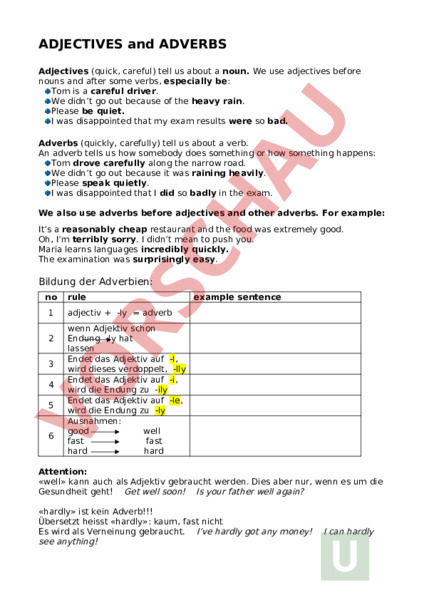Arbeitsblatt: adverbs
Material-Details
Wie man englische Adverbien bildet und verwendet
Englisch
Grammatik
8. Schuljahr
1 Seiten
Statistik
190891
473
6
01.10.2019
Autor/in
Martina Kornmayer
Land: Schweiz
Registriert vor 2006
Textauszüge aus dem Inhalt:
ADJECTIVES and ADVERBS Adjectives (quick, careful) tell us about noun. We use adjectives before nouns and after some verbs, especially be: Tom is careful driver. We didnt go out because of the heavy rain. Please be quiet. was disappointed that my exam results were so bad. Adverbs (quickly, carefully) tell us about verb. An adverb tells us how somebody does something or how something happens: Tom drove carefully along the narrow road. We didnt go out because it was raining heavily. Please speak quietly. was disappointed that did so badly in the exam. We also use adverbs before adjectives and other adverbs. For example: Its reasonably cheap restaurant and the food was extremely good. Oh, Im terribly sorry. didnt mean to push you. Maria learns languages incredibly quickly. The examination was surprisingly easy. Bildung der Adverbien: no 1 2 3 4 5 6 rule example sentence adjectiv -ly adverb wenn Adjektiv schon Endung -ly hat lassen Endet das Adjektiv auf -l, wird dieses verdoppelt, -lly Endet das Adjektiv auf -i, wird die Endung zu -ily Endet das Adjektiv auf -le, wird die Endung zu -ly Ausnahmen: good well fast fast hard hard Attention: «well» kann auch als Adjektiv gebraucht werden. Dies aber nur, wenn es um die Gesundheit geht! Get well soon! Is your father well again? «hardly» ist kein Adverb!!! Übersetzt heisst «hardly»: kaum, fast nicht Es wird als Verneinung gebraucht. Ive hardly got any money! see anything! can hardly
